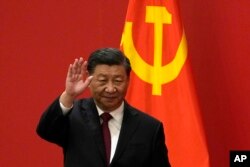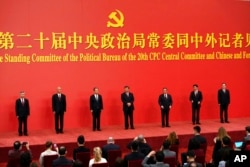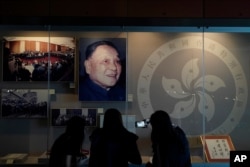German Chancellor Olaf Scholz is scheduled to meet with China’s Xi Jinping on Friday. Scholz heads a delegation of business executives as the first EU leader to visit China since the start of the COVID-19 pandemic. The visit comes less than two weeks after China’s leader Xi Jinping secured an unprecedented third term.
VOA’s Mandarin Service interviewed Joerg Wuttke, president of the European Union Chamber of Commerce in China, on October 27. Wuttke, who has spent some 30 years in China, is a respected observer of the world’s second largest economy who says that Xi Jinping clearly is picking a senior counsel of loyalists, and some have substantially less experience going into their positions than their predecessors. Wuttke says that has increased uncertainty over how they will handle their new leadership responsibilities at a challenging time for China’s economy.
This interview has been edited for length and clarity.
VOA Mandarin: Obviously this big moment has passed. The Party’s Congress is now behind us. What was your first impression or first reaction to the members, to the names of the new Politburo Standing Committee and the Politburo?
Joerg Wuttke: It was definitely a surprise. We have greater clarity now; it is obviously Xi Jinping calling the shots to an extent which we didn’t see before. He has aligned a group of people that are totally loyal to him. We have basically left the sphere of achievements and meritocracy. It is all about loyalty. And we have to see where this group of people are leading China.
VOA: The premiership goes to Li Qiang, who is currently the Shanghai party chief. Tell us about your impression of Li Qiang.
Wuttke: Well, I never met Li Qiang, but what actually concerns me more than an individual is the fact that since 1988 we have never seen a prime minister coming into office that did not shadow his predecessor. So, in a way, we have for the first time someone, who is running a city, becoming head of the state council, which of course is a totally different ship to maneuver. So, I guess that’s going to be very difficult. Also, the head for the economy, Mr. Xuexiang Ding, will be someone who is not acquainted with business.
VOA: Other than Li Qiang as the prime minister, there are some other important people to replace current members of Xi Jinping’s economic team. How about those people?
Wuttke: Yeah, we are in a turbulent time here. We have a real estate crisis. We have a severe impact from U.S. sanctions. We have an increase in debt burden in localities as well as the uncertainty about when are we getting out of this COVID lockdown. It would be great to have a stable and good communicative team at the economic front in order to tell the market where we’re heading. And we don’t. We are basically entering a period of uncertainty. But the uncertainty is by design. The president decided to have a group of loyalists with him in the Politburo. So, let’s see at the end of the day and whatever happens or does not happen is under the watch of President Xi.
VOA: I think on another occasion you spoke with other news media, you talked about how the Chinese Communist Party is not monolithic. There are a variety of views. Some are more liberal, more pro-market and others like Xi Jinping himself are more pro-state. After this reshuffle, the change of guard, do you think there will be more liberal voice in the next administration?
Wuttke: Well, there always will be different voices and the fifty shades of grey about where to steer the country. But it’s very clear in (Xi’s) speech (before the party congress) already. (Xi Jinping) mentioned Karl Marx 15 times. He mentioned the market three times, and it was clearly indicating that he expects international tensions. He mentioned struggle 17 times and 12 times in the context of international affairs. So, he’s preparing the country for struggle, and struggle means … uncertainty and difficult times. He’s trying to obviously rally the population behind him. And we have to see what that leads to. We have an engagement with (German) Chancellor Scholtz next week. The German chancellor coming might give an indicator if Xi Jinping wants to engage with foreign countries, with Europe in particular, as he has been off the scale for 1,000 days. (It) will be very interesting to see how this kind of vision of struggle translates into engagement with foreign leaders. Is he trying to accommodate? Is he trying to reconnect with them in positive terms? Or is that going to be all about, you know, struggle and offense in a way?
VOA: Compared to four or five months ago, are you now more pessimistic or you are about the same or more optimistic for the next, say, three or five years?
Wuttke: I think my struggle is I’m trying to be realistic in order to (see) which direction this might go. We have not entered the space where we know where we’re heading. I have been here for about 30 years. I grew up in opening up mode by Deng Xiaoping. My first Party Congress I witnessed personally was in 1982, where Deng Xiaoping was clearly trying to integrate China, opening up and so forth. But maybe at the tail end of my career in China, I have to witness China actually closing up again to some extent. So, in a way, it’s full circle which is, of course, disappointing. But at the same time, it’s their country, their choice.
VOA: Do you see decoupling down the road? How confident are you, as a member of the business community, about this new leadership particularly on the economic side?
Wuttke: Decoupling is hard to achieve because China is the globalization story, meaning that China is deeply embedded in many, many markets. But decoupling is in the cards (and) can only be achieved in small incremental steps. Luckily, because we want to remain coupled up. We want to be connected. So, in a way, we have a situation where, when you talk about struggle, when you talk about self-reliance, that is a strong indicator that China actually actively wants to decouple. That would be very sad. I think it would actually mean lower growth potential and certainly will also have a negative impact on the global economy. Is it going to end up there? I’m not sure, but certainly we will see some baby steps in that direction. Let’s hope that pragmatism and reason prevail because we have too much to lose, frankly, if we do decouple.
VOA: Are foreign businesses, like European businesses as well as American businesses, are we going to see more like a retreat? Are we going to see more people leaving China?
Wuttke: We see more people leaving China, that’s clear. We don’t see people from business leaving in the sense (of) companies leaving. We see more engagement on the top 10, for example, of European companies. That’s primarily German. That’s primarily cars, chemicals, mechanicals, machineries. Because there’s no other China, there’s no other choice. They have to be here, and they have to be there more engaged even.
But then 10 companies don’t necessarily stand for 1,800 members that European Chamber is representing. We have not seen companies moving away and I don’t expect this, but what we have noticed is that new investment, new additional activities from those companies that normally would come up in China has been rerouted to other regions. So, we see more interest into Thailand, into Southeast Asia, into India, but even closer to home, Turkey and Eastern Europe, for the simple fact that executives can fly in and out easily. They have also realized that the World Bank has predicted China to grow this year 2.8 percent and the rest of Asia 5.3 percent. These leaders follow the money and, hence, there will not be an exodus of European business from China. But we will definitely be underachiever given the potential of this economy.
VOA: In your opinion, do you think the Chinese leadership, particularly Xi Jinping himself and his other senior advisers, are aware of the situation that their economy is not in good shape and foreign businesses are leaving, or at least putting (new) investments on hold?
Wuttke: I think they must be aware of this, that they have smart ministries and consultants and advisers. But again, if you have a totally different policy approach, then actually, you know, foreign business doesn’t mean too much to you. Yes, you needed it in order to make sure that you can close the technology gap. But he had made it very clear that his focus is on state-owned enterprises. His primary goal is not necessarily growth. It is about security, stability. It’s about wealth distribution. It’s about common prosperity. In a way, they go more for stability and are willing to pay an economic price for it.
VOA: You said that it’s end of an era for China.
Wuttke: Yes. Clearly, Jiang Zemin, Hu Jintao’s era was the era where it was all about integrating China peacefully. It was all about getting rich first and powerful later. But now basically, as Mao unified China and Deng Xiaoping made it rich, it seems like that Xi Jinping focus is really making China powerful.
Adrianna Zhang contributed to this report.



